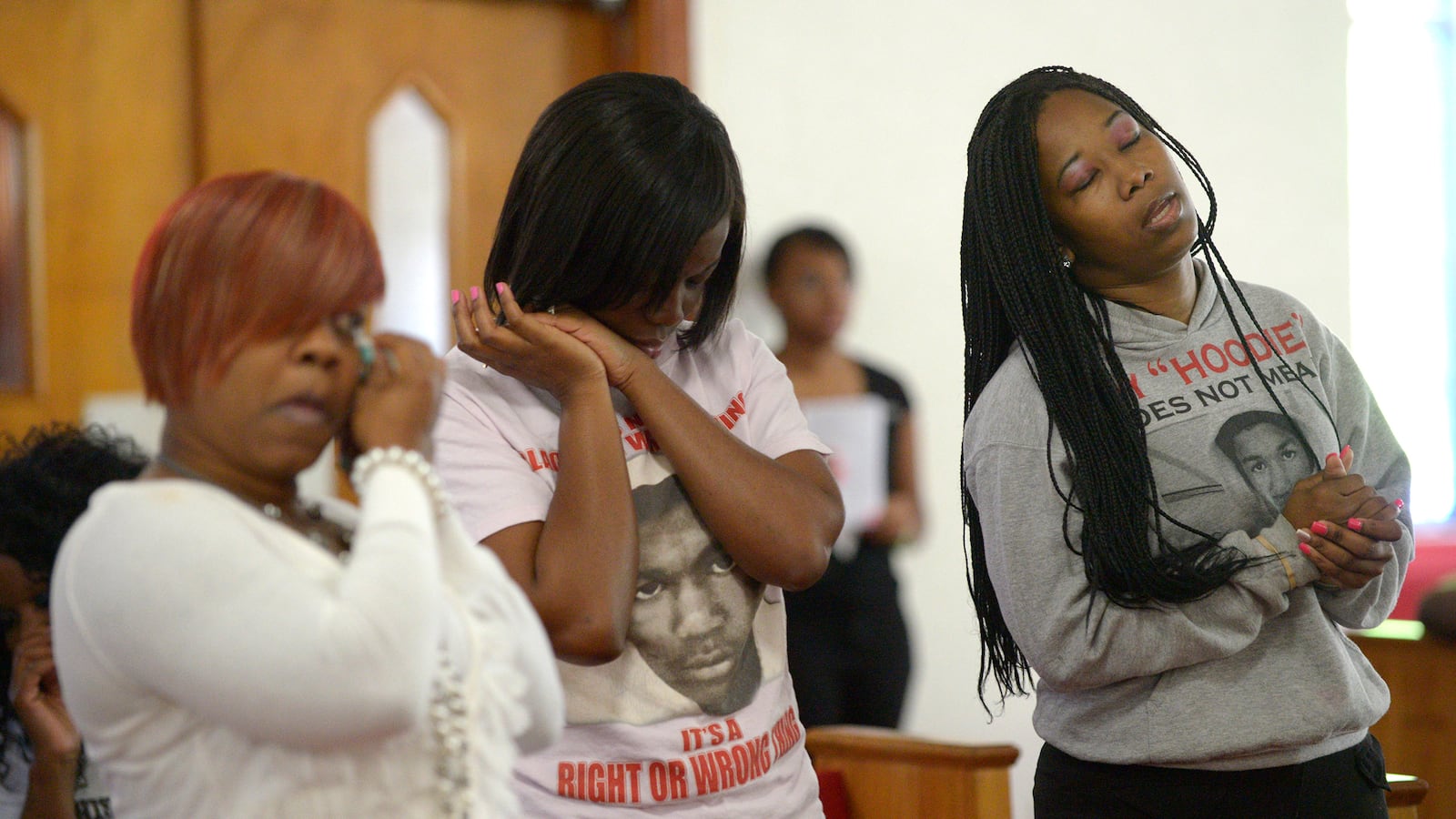It’s just a simple black granite slab, set into a small patch of brick paving at the side of Historic Goldsboro Boulevard, the heart of Sanford’s African-American community. Etched into it is the scantest of inscriptions: “Trayvon Martin, February 26, 2012.”

There is no date of birth listed. For it is the 17-year-old’s death, and not his life, that means the most to this historic neighborhood, founded in 1891 by agricultural laborers as the second all-black town in Florida.
Martin was never a resident here, never one of the children put to bed at night listening to the sound of gunfire in the streets or peering out of their windows at the run-down, boarded-up public-housing blocks in this blight-ridden section of town.
But he died in Sanford, and his name, and the manner of his death, resonate with residents who view what happened to him as symbolic of their own social struggles and racial strife.
“Trayvon was one of us. He was part of us. He represents us,” says Oscar Redden, running the American flag up the pole outside the community-assistance center he runs here, helping people with substance-abuse problems, disabilities, and welfare woes. He stops the flag at half mast. “For Trayvon,” he explains.
The acquittal of George Zimmerman, who shot Martin dead in his gated middle-income community last year after profiling him as a prowler who must be “up to no good,” has angered this already angry community, he said.
“How can you violate the law, be the aggressor, the provocateur, and wind up killing—but then say you did it in self-defense?” asks Redden. “Only in this country, in this atmosphere, can you do that,” he says, going on to lament a number of issues that trouble him and his community: perceived racial inequalities in the judicial system, racial profiling by police, a lack of attention by civic authorities to Goldsboro’s economic and social needs.
In Goldsboro, residents poured into churches to pray for the victim, for his family, and for peace. “Lord, I thank you for sending Trayvon to reveal the injustices that live in Sanford,” the Rev. Valarie J. Houston, the pastor at Allen Chapel Church, told her congregation.
Myra Gordon, 35, a mother of six who lives in Goldsboro, went to pay her respects at the memorial to Martin.
“Hopefully no fighting will come out of this, and instead we can all grow from it,” she said.
One of her sons is 17, the same age as Martin when he died. “Look how easy it is for a young black man doing nothing wrong to be seen as a criminal. You can’t label someone for their color and their clothes. You try not to make this a racial issue, but how can we not?” she said.
Redden said that he had prayed for peace, but feared for the future.
“My fear is not today, but for our tomorrow. You can only oppress a community for so long before they will fight with toothpicks against machine guns. Us older generation, we want to bring positive change, but there are a lot of young people coming on the scene who don’t have the patience we have. They have heard my story, their parents’ stories, their grandparents’ stories. They think, something needs to be done,” he said.
Police in Sanford initially declined to charge Zimmerman, but a special prosecutor, Angela Corey, later did so amid a national outcry and pressure from political, religious, and community leaders. Both the Zimmerman and Martin families appealed for calm yesterday, along with civic and law-enforcement agencies, civil-rights leaders, and even President Obama.
Yet to what extent the case was really ever about race remained in debate. Prosecutor John Guy had told jurors that it was not, and that it was down to the simple premise of “right and wrong.” But that was just in court.
After the state lost the case, Corey clarified that “this case has never been about race, nor has it been about the right to bear arms, not in the sense of proving this as a criminal case.”
“But Trayvon Martin was profiled,” she stated.
The NAACP called on the Department of Justice to pursue federal civil-rights charges against Zimmerman. The department said it would think about it, but already appeared to be trying to tamp down expectations in its statement announcing as much, while President Obama attempted to steer discussion away from race altogether and refocus it on his quest for tighter gun-safety legislation.
“We are a nation of laws, and a jury has spoken,” he said in a statement.
“I now ask every American to respect the call for calm reflection from two parents who lost their young son. And as we do, we should ask ourselves if we’re doing all we can to widen the circle of compassion and understanding in our own communities. We should ask ourselves if we’re doing all we can to stem the tide of gun violence that claims too many lives across this country on a daily basis. We should ask ourselves, as individuals and as a society, how we can prevent future tragedies like this. As citizens, that’s a job for all of us. That’s the way to honor Trayvon Martin.”
The Rev. Al Sharpton called Saturday’s not guilty verdict a “slap in the face for the American people.” He will travel to Sanford this week to help spearhead protest rallies. Only a small handful of protesters remained yesterday outside the Seminole County Criminal Justice Center in Sanford, where the three-week trial was held, and a few hundred rallied in the city’s downtown Fort Mellon Park late Saturday.
“No justice, no peace,” they chanted.
The Rev. Jesse Jackson said that he was “sad and disappointed” that Zimmerman had not been held accountable.
“It is a pattern involving young black men that is too often repeating itself. In my view the American legal system has once again failed justice,” complained Jackson.
Zimmerman—depicted by state prosecutors as a “wannabe cop” who profiled and pursued the hoodie-wearing black student and by the defense as a well-meaning community volunteer who shot to save his own life after Martin punched him and beat his head on the ground—may be free, but will be “looking over his shoulder for the rest of his life,” said his brother.
“There are people that would want to take the law into their own hands or be vigilantes in some sense if they think that justice was not served. They won’t respect a verdict, no matter how it was reached, and they will always present a threat to George and his family,” said Robert Zimmerman Jr.
Martin’s parents consoled themselves with prayer. “Lord, during my darkest hour I will lean on you,” noted his mother, Sybrina Fulton, on her Twitter feed. The family’s legal team described them as “heartbroken.”
“A black 17-year-old child should be able to walk home from a store and not be shot,” said Nataly Jackson, one of the family’s attorneys, her bottom lip quivering. There had been changes for the better in Sanford since the boy’s death, she said, and “there’s a victory in that.” And people might think twice about Zimmerman-style vigilantism in the future, she said.
“I don’t want them [Martin’s parents] to be discouraged, because they may have saved the life of another child,” she said.






